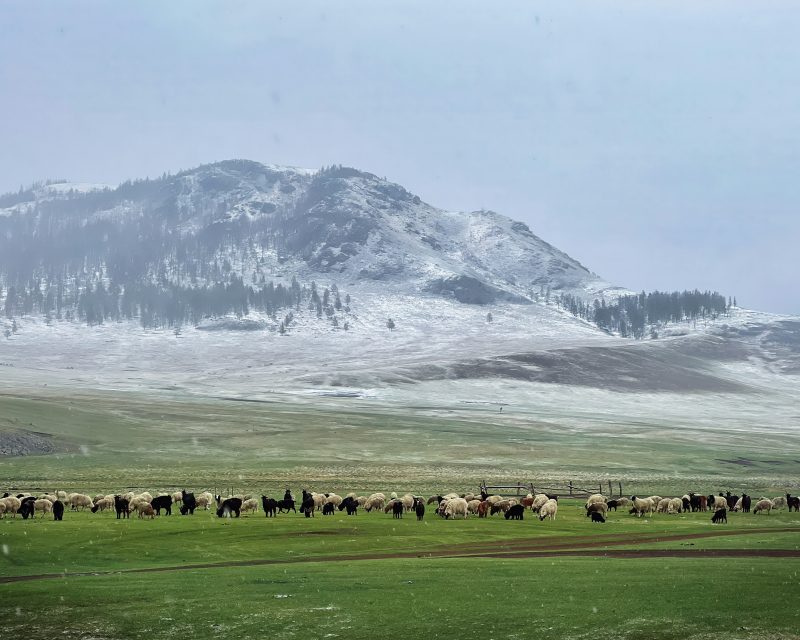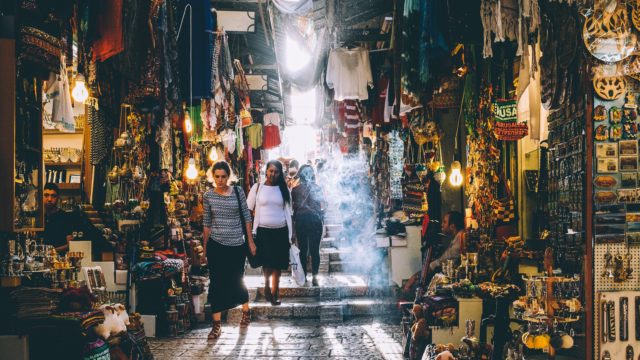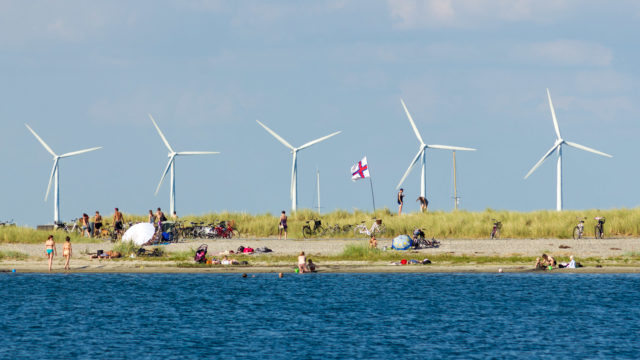Mongolia – the intertwined issue of air and soil pollution in Ulaanbaatar
Extremely cold winters in Mongolia mean people in 'gers' warm up by using coal, resulting in high levels of air and soil pollution

Mongolia endures extreme air pollution during winter months where temperatures can fall below -40c. Recent years have seen many nomadic rural communities settling on the outskirts of Ulaanbaatar as a result of failing pastoral systems. To survive the winter, these settlements, known as gers, are heated by subsidised unwashed coal and stoves resulting in alarming levels of air and soil pollution.
The ger district houses 60% of Ulaanbaatar’s population and is where the most marginalised and vulnerable reside. Many of the ger households have settled there informally. The health crisis is particularly significant for mothers and young children. To some degree this problem has been ameliorated by the government banning the use of raw coal in ger districts in 2018. People are instead using more fuel-efficient compressed briquettes, provided by the government and an initial subsidy to help ger community members has supported the change in the community.
Whilst the air pollution issue is beginning to be addressed, albeit still a significant issue in Mongolia, the interrelated problem of soil pollution remains. Interviews with households revealed that soil pollution in Ulaanbaatar was the most pressing community level issue. In particular, in spring during the snow melt, citizens complain that the coal dust that has fallen on the snow percolates into the soil and ground water. These local issues and potential solutions were explored with stakeholders. Air pollution, local waste management, sanitation, disjointed social relationships in the ger districts, and the stalled ger district redevelopment led to the launch of a ‘participatory solutions’ campaign aimed at strengthening community cooperation around air pollution.
A key player in advocating for social change
Since 2016, the Economic Policy and Competitiveness Research Centre (EPCRC) has been working with the GEC on creating policy conditions for transformation towards an inclusive green economy and on improving civil society participation for sustainable finance reforms. In phase one, the air and soil pollution issue was highlighted during a national ‘Go Green Economy! Make It or Fake It’ workshop, helping to position ECPRC as a national player for the green economy transition.
The workshop explored results from a pilot of the use of a systemic inquiry approach in one ger district in Ulaanbaatar with 120 households, which led to a subsequent ‘Soil Pollution Campaign’ to improve toilets, as part of an intervention to address soil pollution for the vulnerable ger community. EPCRC focused on awareness raising and proposing policy recommendations to the government representatives present.
Several reports with the then Ministry of Environment were published and the Head of Strategic Policy pushed forward an action plan to actualise the Green Development Policy of Mongolia- which was later integrated into the succeeding long term policy document Mongolia’s Vision-2050. The participation of the ECPRC in authoring the “Green Economy Policy Assessment: Mongolia” study undertaken by the UN’s Partnership for Action on Green Economy (PAGE) initiative in 2018 and the “Green Economy Policy Review of Mongolia’s Green Development Policy: Mid-Term Review” by the United Nations Environment Programme (UNEP) in 2021 were further examples of recognition of the hub’s work in this area.
In phase two of this project EPCRC compiled a Contextual Financial Analysis (CFA) on the economy, financial services, and an overview of the state of green financing for MSMEs. It examined the informal economy, employment, policy and regulations and mapped the stakeholder landscape, documenting signature issues. At around the same time, online campaigns were conducted to improve the Green Guide website, which the had EPCRC launched earlier. The campaigns were aimed at adding educational elements to provide more information regarding financial literacy, green finance, green economy related studies and more. Dialogue events exploring these issues convened citizens and local enterprises, and stimulated interest from government and private sector initiatives for collaboration. Two of the biggest commercial banks in Mongolia, issuing green loans, expressed interest in and were supportive of the ideas that came from dialogue discussions.
As a result of this experience, EPCPR has fundamentally expanded their work to evolve beyond the economy and to incorporate a social, climate and sustainability lens. EPCRC has evolved into an organisation that engages communities to advocate for societal change through participatory methodology. Their work with communities has been inspiring and interviews with households from the ger area were organised to advise on how to build, maintain and use latrines, to avoid contaminating the surrounding soil. First line government officials were part of these meetings and were able to hear problems first hand from residents.
“ The action in Mongolia has raised local voices and advocacy efforts for participatory and greener solutions, in particular those from the ger community”
Better futures built by local communities
Encouragingly, residents have helped to improve the situation in their community through collective action. Acquiring new knowledge has helped to change mindsets through the dialogues process. Community engagement resulted in pilot households taking the initiative to address sewage issues, by creating a schedule for cleaning the neighbourhood. This was an issue that was not known to neighbours and through EPCRC’s interventions, conversations were fostered about shared problems, helping to create a collective voice.
The multi-stakeholder approach adopted by EPCRC was key to expanding reach to different sections of society and included front line government staff, university students and the several government departments. In particular, the air pollution campaign involved consulting with students on how to improve inter-community relationships and work with universities led to green economy and renewable energy featuring on the curriculum. In fact, one student is now a member of the EPCRC team!

Gender and youth work has also been fully adopted into the DNA of the organisation and EPCRC has had success in entrenching women’s rights into policy. Recommendations from the finance dialogues phase of this project were presented to parliamentarians and key stakeholders, who initiated the drafting of a new Law on Enhancing Economic Participation of Women Entrepreneurs. This draft law aimed to recognise female entrepreneurs and the limitations in access and availability to finance.
Conclusions
The action in Mongolia has raised local voices and advocacy efforts for participatory and greener solutions, in particular those from the ger community. Global conversations, campaigns and events have helped to raise awareness of the issues these vulnerable groups are facing and have engaged women and youth in participatory methods.
During the course of the action, EPCRC has engaged with high level policy work around air pollution and the wider green economy transition. This work encouraged the directive on banning coal and funding alternatives. Furthermore, the government has now passed a law to only distribute washed coal. EPCRC has contributed to the creation of a supportive environment to welcome positive steps forward, such as legislation to prevent climate change.
EPCRC plan to launch a campaign focusing on insulation. Herding communities suffer during the winter with heavier snowfall caused by climate change. Livestock numbers dwindle and crop growth is stunted, producing little feed for the animals. Improved knowledge about insulation techniques could help to educate herders and future proof them from climate related damage, taking their futures into their own hands.
- Zaiza Khan, GEC


